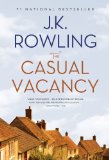Summary | Excerpt | Reviews | Beyond the Book | Read-Alikes | Genres & Themes | Author Bio

This article relates to The Casual Vacancy
J. K. Rowling grew up in England's West Country, which is an informal term used to embrace the southwestern part of England, the peninsula that juts out into the Atlantic Ocean. The West Country doesn't have any rigid borders but generally includes the counties of Cornwall, Devon, Dorset and Somerset. A looser definition also includes all or parts of the counties of Wiltshire and Gloucestershire.
 Rowling grew up in the towns of Winterbourne and Tutshill in Gloucestershire. She also spent some time in Chepstow, which is actually in Wales, with suburbs spilling across the boarder into neighboring Gloucestershire. Chepstow also boasts a castle plenty capable of firing up the imagination. These towns, like much of the rest of the West Country are an idyllic part of England known for rolling hills, country houses and picturesque scenery. While there is some debate about the exact setting for The Casual Vacancy, Rowling has found inspiration for much of her work from the area's small towns and villages. Rowling has said she has fond memories of playing by the River Wye, which is one of the longest rivers in the UK and flows right by Chepstow and Tutshill.
Rowling grew up in the towns of Winterbourne and Tutshill in Gloucestershire. She also spent some time in Chepstow, which is actually in Wales, with suburbs spilling across the boarder into neighboring Gloucestershire. Chepstow also boasts a castle plenty capable of firing up the imagination. These towns, like much of the rest of the West Country are an idyllic part of England known for rolling hills, country houses and picturesque scenery. While there is some debate about the exact setting for The Casual Vacancy, Rowling has found inspiration for much of her work from the area's small towns and villages. Rowling has said she has fond memories of playing by the River Wye, which is one of the longest rivers in the UK and flows right by Chepstow and Tutshill.
Much later in life, after a nasty divorce, Rowling lived on welfare benefits for a while. She has repeatedly championed the value of the welfare system in providing for the poor, a theme she writes about vividly in The Casual Vacancy. Even if she might not have lived in government-subsidized housing known as council estates in England, one such council estate is the basis for the novel.
The council homes (many of which together belong in an estate) have a long history in the UK. After the First World War, these estates were labeled 'homes for heroes', and shortly after the Second World War, were seen as an efficient way to dampen disease and overcrowding in cities and give the working classes a safe and relatively inexpensive place to live. While for many years, finding a home in a council estate was considered a move up, this housing (subsidized by local taxes) has actually curried increasing disfavor to the point where many estates are pointed out as hotbeds of poverty and decreased social mobility. Delineation of these housing units from private sector housing has had commentators wondering if council estates have become "social concentration camps."
 While common perception might lead us to think of these council homes as cramped apartments in huge high-rises, council estates outside of city centers are more likely to look like the photo to the right.
While common perception might lead us to think of these council homes as cramped apartments in huge high-rises, council estates outside of city centers are more likely to look like the photo to the right.
Rowling, a strong believer in the role of government helping the needy, has made a point of saying that she intends to stay living in England, despite the country's relatively high taxes, because she knows that the British welfare system supported her when she needed it, and she now feels a responsibility to give back. She has also donated generously to many charities, including millions to multiple sclerosis research (a disease her mother died of), and set up a trust with an annual budget of millions to help women and children overcome poverty and social inequality.
Check out a wonderful BBC program about the evolution of subsidized housing.
Top photo by Roy Parkhouse; bottom photo by John Poyser
Filed under Society and Politics
![]() This "beyond the book article" relates to The Casual Vacancy. It originally ran in November 2012 and has been updated for the
July 2013 paperback edition.
Go to magazine.
This "beyond the book article" relates to The Casual Vacancy. It originally ran in November 2012 and has been updated for the
July 2013 paperback edition.
Go to magazine.
Your guide toexceptional books
BookBrowse seeks out and recommends the best in contemporary fiction and nonfiction—books that not only engage and entertain but also deepen our understanding of ourselves and the world around us.